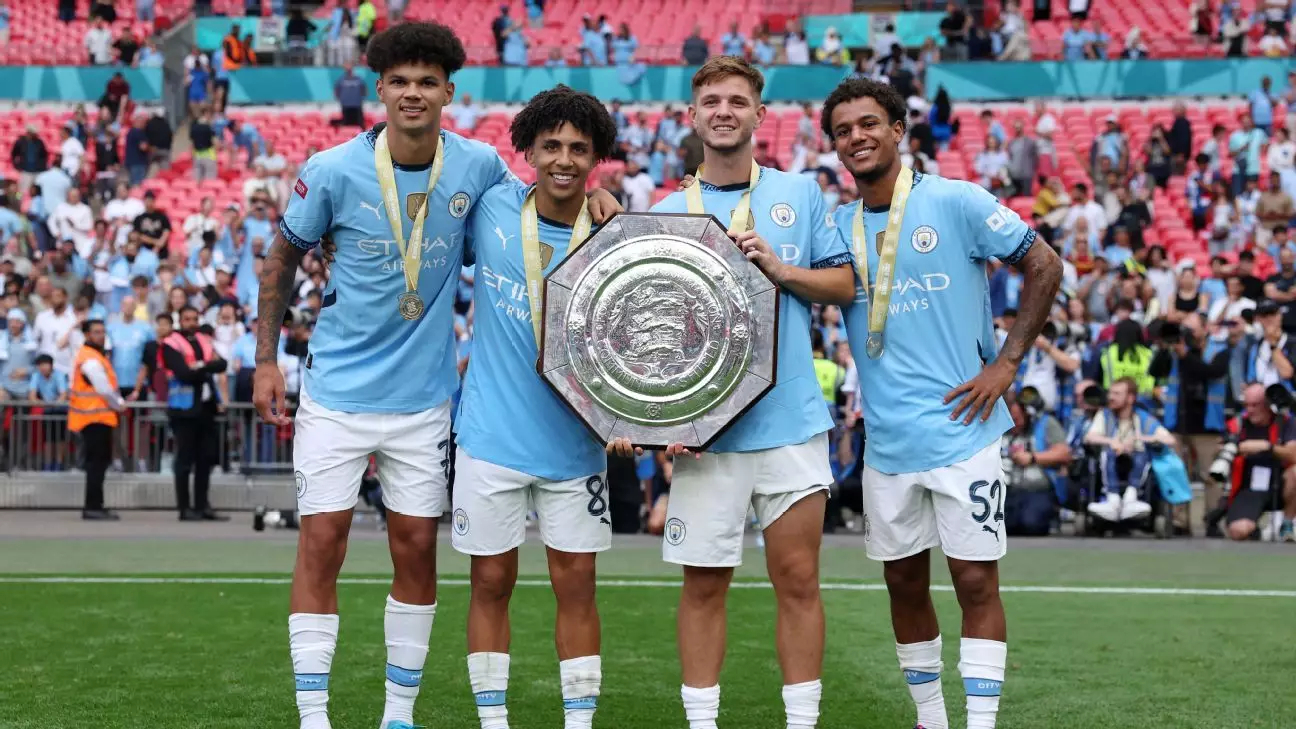The narrative surrounding Manchester City’s transformation into a European football powerhouse is widely recognized, particularly following the lucrative takeover by the Abu Dhabi United Group in 2008. However, the strides made in cultivating youth talent in the club’s academy are equally impressive and often overlooked. This article delves into how Manchester City’s academy has evolved from modest beginnings to become a leading force in nurturing talented young footballers and its impact on the club’s first team.
In the early 2000s, Manchester City’s youth setup lacked the cutting-edge resources it boasts today. Thomas Krucken, the club’s youth academy director, offers a glimpse into the club’s formative years. During his tenure as a foundation phase coach, he managed players like Shaun Wright-Phillips and Kasper Schmeichel while having to rely on rudimentary training tools. “We had nothing,” recalls Krucken, illustrating how far the academy has come.
Presently, the City Football Academy is a state-of-the-art facility that significantly enhances the training experience for young players. The transition from the Platt Lane Sports Complex to the City Football Academy symbolizes a broader shift in how youth talent is developed. “Now we have everything we need to develop top players,” Krucken states with evident pride. The link with St. Bede’s College, a prestigious private institution, represents an additional investment in the holistic development of young athletes.
Despite the substantial advancements in infrastructure and training methods, Manchester City’s core objective remains steadfast: producing high-caliber players ready for professional competition. The academy not only focuses on enhancing physical skills but also on instilling the tactical and intellectual understanding of the game that coaches like Pep Guardiola demand.
Phil Foden has emerged as the poster child for this academy success, becoming a key figure in the team’s achievements. Nonetheless, Foden’s journey is simply the most prominent example in a sea of talent that City is committed to cultivating. Recent matches have seen as many as nine academy graduates taking the pitch, marking a trend where homegrown talents increasingly feature in competitive fixtures, including high-stakes games like the Community Shield.
As Guardiola treads into the Carabao Cup, he continues to lean on the academy, emphasizing that young players are integrated into his tactical system from an early age. His understanding that players will take time to adapt—especially when transitioning from youth to senior football—reflects a nurturing approach that many young prospects, including James McAtee and Oscar Bobb, appreciate.
However, the journey for young footballers at City is multifaceted. While academy graduates are presented with opportunities to prove themselves, they must also contend with the arrival of high-profile signings who can quickly reshape the squad dynamics. Bobb poignantly encapsulates the challenge: “You have to perform very well to get that chance.” This reality creates an environment where players must exceed expectations to carve out their niche.
A keen example is Rico Lewis, who made strides across both full-back and midfield positions only to encounter increased competition following sizable investments in new players like Mateo Kovacic and Josko Gvardiol. The financial clout of the club means that every young talent must remain at peak performance to solidify their spot in the lineup, and this competitive pressure can be both motivating and daunting.
Krucken’s philosophy extends beyond immediate concerns; he envisions a proactive approach to youth development by anticipating future trends in football. “We are sure the speed of the game will keep increasing,” he notes, indicating that the demands placed on players will evolve. The challenge lies in preparing the current batch of young footballers to compete at levels that may not yet be fully realized.
While the pathways are clear for some, it’s important to recognize that not all academy graduates will find a home at City’s first team. The intense rivalry for a spot means that many talented individuals may need to explore opportunities elsewhere. However, Manchester City has proven adaptable, effectively ensuring that their academy alumni can transition to other clubs and command significant transfer fees.
The financial ramifications of successfully nurturing talent are significant. Reports indicate that Manchester City has realized substantial transfer income from their academy graduates, amounting to approximately £276 million over the past five years. This influx has enabled the club to maintain fiscal sustainability, even amidst large-scale investments in new players.
As Guardiola reflects on past academy successes with players like Jadon Sancho and Cole Palmer, he firmly expresses hope for the future. Ensuring the continued effectiveness of the academy could facilitate both the realization of homegrown talent and the club’s long-term financial health.
The evolution of Manchester City’s youth academy has been transformative, marked by investment, foresight, and a commitment to nurturing future football stars. As this process unfolds, the club not only strives for immediate success but also secures a sustainable future that intertwines youth development with its ambitions on the pitch. The upcoming match against Tottenham will offer yet another opportunity for academy graduates to display the fruits of this comprehensive development system.

Leave a Reply